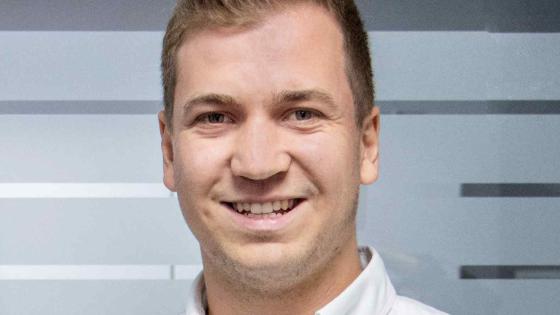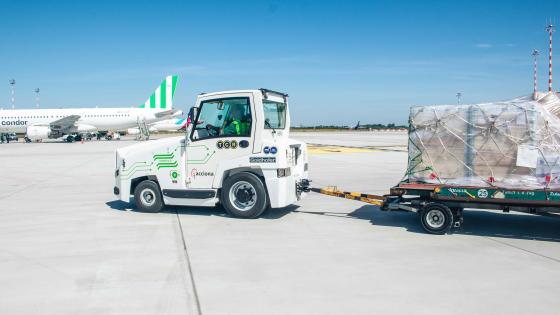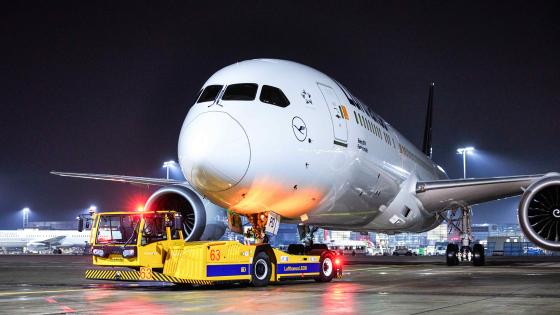Based in Memmingen in southwestern Germany, Goldhofer began life in 1705 as a forge, fashioning horseshoes, coaches and the like. Post-World War Two, the company turned its attention to trailers, initially for local farmers, before evolving into today’s global business, offering everything from flatbed trailers for warehouse use to aircraft pushback vehicles and towbarless tractors. Its technology can be seen everywhere from airports to mines and shipyards. The firm prides itself on working closely with its customers, andit is no surprise that its portfolio includes a growing number of products witheco-friendly technology at their heart.
Luca Köhler, product manager airport technology, told Airports International that there are two key elements that make Goldhofer products environmentally friendly. The first of these is IonMaster lithium-ion battery technology, which provides maximum power density and optimum runtimes. The modular battery system is configurable for individual deployment, is maintenance-free, and is fast to charge. According to the company, IonMaster technology is in use worldwide under all environmental conditions, from-22°F to +125°F, and the lithium-ion battery means that handling is safe and straightforward.

Luca Köhler, product manager of airport technology at Goldhofer
The second element is the Active TMS (thermal management system), which Goldhofer developed to require the lowest possible amounts of energy over the long term. Like the IonMaster, Active TMS operates in extreme temperatures, both hot and cold.
Köhler explained that making Goldhofer’s existing product range more environmentally-friendly is an ongoing process: “Continuous technical optimisations and further technical developments based on individual components are, of course, always observed and incorporated. For example, our battery technology is always state-of-the-art, featuring the same installation space, higher capacity and optimisation with regard to the use of resources.”
Goldhofer recognises the demand for retrofitting existing products with more environmentally-conscious components and is currently analysing the potential for standardised retrofit solutions. “We are closely monitoring the market and are discussing individual cases with several customers,” Köhler said.
He explained that Goldhofer provides comprehensive support, from the sale of vehicles to holistic consulting services regarding the development of infrastructure and fleet composition to support customers as they convert to electromobility, not least in terms of cost and resource efficiency: “With the help of additional digital services via the Goldhofer LINK telemetry system [which transmits live data from sensors located on the vehicle via a cloud to a user-friendly dashboard], we have achieved the networking of man and machine. This means, among other things, the optimisation of maintenance intervals, the optimised utilisation of the service life of components (thereby saving resources), the optimisation of the total cost of ownership [TCO] and the tracking of operating parameters, leading to improved planning and less downtime.”

The SHERPA E battery-powered cargo tow tractor in operation
Today, Goldhofer manufactures vehicles capable of carrying a payload range of 25 to 15,000 tonnes at its 100,000m2 site in Memmingen. Its products can be found at airports worldwide, with an emphasis on Europe (Germany, the UK, Spain, Finland, Ireland, Hungary and Romania), North America, China, India, Abu Dhabi and Dubai. By 2018, the company had delivered more than 40,000 vehicles to over 160 countries.
Köhler won’t be drawn on what new products Goldhofer is working on, but notes that they will be eco-friendly. Within the wider air cargo sector, he expects an ongoing focus on e-mobility, in particular any technologies that can increase speed and, consequently, the rate of turnover. Köhler also predicts an emphasis on semi- or fully-autonomous vehicles within an air cargo context.

A Phoenix E-battery-powered towbarless aircraft tractor in use by Lufthansa LEOS, the Lufthansa Group’s ground handling specialist
